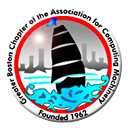From Introducing Computer Law in 1960 to the Modern Law of the Mind
A futile effort to escape the burdens of searching massive files of evidence without machine help sensitized Freed's natural engineering aptitude, in 1960, to unveil computer law to anticipate the diverse legal ramifications of just emerging computers. After retiring from that law practice in 1986, Freed's user-knowledge of computers revealed them as rough models of the functioning mind to derive an overall perception of it that is especially instructive to non-scientists. Now, his noting the legal ramifications of that perception and of the related fact that all information is physical, as energy signals, is enabling him to introduce the modern law of the mind as a sequel to computer law.
This joint meeting of the Boston Chapter of the GBC/ACM and IEEE Computer Society will be held in MIT Room E51-345. E51 is the Tang Center on the corner of Wadsworth and Amherst Sts and Memorial Dr.; it's mostly used by the Sloan School. You can see it on this map of the MIT campus. Room 345 is on the 3rd floor.
Up-to-date information about this and other talks is available online at http://www.gbcacm.org.
Roy graduated from Yale Law School in 1940, during the Great Depression. Most of first half of his law practice was in anti-trust litigation for the Department of Justice and, then, for private litigants. That sadly entailed organizing masses of evidentiary documents without machine help. Upon escaping that by introducing computer law, he became inside counsel for Computer Control Co., in Framingham, largely by having met Ben Kessel, its president, at the First (and last) Annual Conference on Law and Electronics at Lake Arrowhead, CA in October 1960, sponsored by UCLA. In 1970, he entered law practice in Boston specializing in computer law and representing both users and suppliers of the technology with respect to the wide variety of legal issues involved. He developed his practice by lecturing through much of the developed world, and writing extensively, about the diverse facets of computer law. His last case before retirement in 1986 was to represent M.I.T. in negotiating an extremely successful contract with Wachovia Computer Services for it to process M.I.T.'s student loan program, at a time when computer contracting was a source of litigation. Recently, he has been thinking deeply independently about the human mind as a unique biopsychosocial machine roughly analogous to a computer, but far superior to one and writing and lecturing about his perception. That is leading him to conjure up the legal ramifications of that perception as the modern law of the mind.
